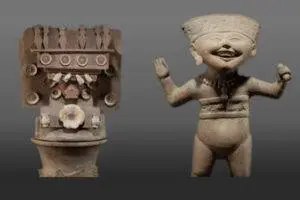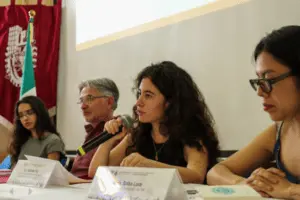Speech by President Andrés Manuel López Obrador during the presentation of the Constitutional Reform Bills
February 5, 2024
Friends:
Mexicanas, Mexicanos:
On this historic date we commemorate one more anniversary of the Constitution of 1917 currently in effect; and here in this venue, where the Liberal Constitution of 1857 was approved I would like to inform the people of Mexico of the bases and motives that inspire me to present a package of legal reform bills aimed at modifying the content of anti-popular constitutional articles that were introduced during the neoliberal or neoporfirist period. All of them, all these reforms of the neoliberal period run contrary to the public interest. They are adulterations that negate the general sense of our Magna Carta, which was the fruit of a popular, revolutionary movement and, therefore, was conceived from the beginning with a national, social and, I would like to emphasize, public spirit in mind.
The reforms I propose seek to establish constitutional rights and strengthen ideals and principles related to humanism, justice, honesty, austerity, and democracy that we have advanced and put into practice since the beginning of the current national transformation movement.
I maintain that Mexican Humanism is nourished by the cultural heritage bequeathed to us by the great Mesoamerican civilizations and by the fertile political history of our country with its exemplary heroes such as the father of our country, the priest Miguel Hidalgo y Costilla, who not only fought for Independence, but also, and with greater emphasis, for justice.
That is why the date most celebrated by the people of Mexico is the date of the beginning of this process, the Grito de Dolores, and not the date of the consummation of Independence eleven years later. Mexicans care more about the precursor, the priest Hidalgo, than Iturbide, the consummator; because the priest was the defender of the common people and the royalist general represented the elite, those at the top, and his only interest was in putting on the imperial crown. Hidalgo was made of different stock. He was the first to proclaim the abolition of slavery.
In thought and action, Hidalgo was a revolutionary and did not beat around the bush. For example, in one of his letters to Intendant Juan Antonio Riaño, he wrote: «There is no remedy, Señor Intendant: the current movement is great, and much more so when it comes to recovering holy rights, granted by God to the Mexicans, usurped by cruel, bastard, and unjust conquerors, who, aided by the ignorance of the natives, and accumulating holy and venerable pretexts, went on to usurp their customs and property and vilely, from free men, convert them to the degrading condition of slaves.» For that thought, the royalist oligarchs not only assassinated him, but also cut off his head and exhibited it for more than ten years in the main square of Guanajuato.
The same can be said of the public life of another good and rebellious priest, José María Morelos y Pavón, who in 1813 in Chilpancingo, Guerrero, released a document known as Sentimientos de la Nación, a foundational text that gathers and expresses -in a few words, with simplicity and good prose-, a treatise of humanism still relevant today due to its important social dimension. The 23 points dictated by Morelos are very profound in term of democracy and legality, but there are four of these ideas that seem to me to be of exceptional humanist importance. For example, Morelos said: «Let indigence and opulence be moderate». I say on this occasion: I cannot find a simpler formula to deal with the age-old problem of economic and social inequality in our country.
And although it may seem incredible and may surprise us, in the times of neoliberalism, which ended five years ago, inequality became even more extreme and offensive. That is why fighting it with a better distribution of wealth, income and budget, is today one of our greatest and most important tasks, and moving forward to achieve it should continue to be our main source of pride.
Morelos thought, and I quote: «The peon’s wage should be raised». Look how he formulates it. It is just a few words, «that the peon’s wages should be raised». Is this demand also not clear enough? Let’s start from the premise that during the neo-liberal period to which I have referred on countless occasions, and which fortunately in our country that nightmare is now over, the impoverishment of the people was accompanied, in those 36 years, by a systematic and permanent loss of the purchasing power of wages.
Morelos demanded «that the son of the peasant and the miner should be educated the same as the son of the richest landowner.» This basic principle has to do, undoubtedly, with public, free and quality education, which was at risk, let’s not forget, during the neoliberal period, when they tried to privatize education and left it at the whim of the free market, as if it were a commodity. In essence, the misnamed educational reform of the previous presidential administration was just that: education was not a right, but a privilege reserved only for families who could pay for it. Now, guided by Morelos’ dream, we are working on four basic measures:
To treat teachers with dignity and not to short-change them their labor rights; never again to discredit the teaching profession.
To improve educational facilities through the program The School is Ours;
To modify, as we have done, the educational content of textbooks to restore civics, ethics, history, and humanism, without undermining mathematics, chemistry, physics and other fields of the natural sciences;
To make it a constitutional right for students from poor families to obtain scholarships to finish their studies, because to make the right to education effective it is not enough to provide free access to schools. If children and young people do not have enough to eat, clothe, and transport themselves, they simply cannot study, and in these conditions, economic support, a scholarship, however modest it may be, can make the difference between going to school or remaining on the margins of education.
Morelos demanded «that there be courts that protect the weak from the abuses committed by the strong». This precept obliges us to put an end to impunity and to stop punishing exclusively those who have nothing with which to buy their innocence while protecting white-collar criminals. The Judiciary cannot continue to be a group of institutions at the service of political and economic interests; on the contrary, it must assume its role as guarantor of justice and enforce a true rule of law, in which nothing and no one is placed outside of or above the law.
Although for me these are the most precise and valid hypothesis, there are other points of great importance in the Sentiments of the Nation. For example, the one that declares “America to be free and independent from Spain and also from any other nation, government or monarchy,» the point that establishes that «sovereignty comes from the people»; the one that reaffirms that we are a Republic and divides the branches of government into Executive, Legislative and Judicial; the point that states that the liberal government must replace the tyrannical one; the claim of general laws that are valid for all, and, therefore, the tacit abolition of perks and privileges.
Point 15 outlaws slavery and caste distinctions forever. And something truly visionary of this profoundly humane priest and precursor of justice: Morelos declares torture to be prohibited.
With the Mexican Revolution, these popular demands were taken up again and others of great importance were added. Flores Magón, Francisco Villa, Emiliano Zapata, Francisco I. Madero, and General Cárdenas led the people to establish a new economic, social, and political order that made the peasants’ right to land, the demand for fair wages and a work day for workers, the nation’s control over our natural resources and other desires for justice, freedom, democracy, and national sovereignty a reality.
But as time went by, these rights, achieved through the suffering and sacrifice of millions of Mexicans in the struggles of Independence, Reform, and Revolution, gradually lost their effectiveness, while perks and privileges were reestablished for the benefit of an economic and political power elite. There is no need to argue much about how in the neoliberal or neoporfirist period, from 1983 to 2018, all public life in Mexico was controlled by an ambitious and rapacious minority. Mexico was a country of a few and for the few, the people did not exist.
For this reason, people who were tired of so much abuse and contempt supported the current transformation movement, which has achieved truly profound demands, peacefully, especially in the field of social justice and the fight against corruption.
Students, young people, women, the elderly, indigenous people, peasants, workers, artists, teachers, merchants, small and medium-sized businessmen and women are now taken into account, and the new economic policy is promoting prosperity for all Mexicans, from the bottom up. Specifically, poverty and inequality have been reduced.
However, it is essential to protect what we have achieved together and from below, all that has been achieved for the benefit of the people, and to continue fighting for a better, more just, free, egalitarian, and fraternal society.
It is against this backdrop that we present today, this historic day, the following constitutional reforms which, in essence, propose the following:
To recognize indigenous peoples and communities and Afro-Mexicans as subjects of public rights (TN—1), giving them preferential attention because they are the oldest and, at the same time, the most forgotten inhabitants of Mexico; consult them when work projects are carried out that may affect their lives or environment and provide them with legal legitimacy to receive budget resources and promote writs of unconstitutionality of laws that affect them.
To reaffirm the right to a pension for the elderly starting at age 65 and increase the amount year after year. The same holds true for people with disabilities, who will receive a universal pension.
To grant scholarships to students from poor families at all levels of schooling.
To guarantee comprehensive medical care free of charge to all the inhabitants of Mexico.
For workers and their families to be able to own their own homes.
To prohibit the mistreatment of animals.
To prohibit transgenic corn and hydrocarbon extraction through fracking throughout the country; not granting concessions for open-pit mining activities.
To enforce respect for areas plagued by water shortages and only authorize concessions in these areas for domestic use.
To prohibit the sale of vapers and chemical drugs such as fentanyl. To severely penalize the crime of extortion perpetrated by organized crime and do the same with fiscal crimes by white-collar criminals, through the use of invoice mills.
Under no circumstances should the increase in the minimum wage be allowed to be less than the annual inflation rate.
The minimum wage for full-time teachers in basic education teachers, as well as for police officers, members of the National Guard, soldiers, sailors, doctors and nurses, cannot not be less than the average salary earned by workers enrolled in the social security system.
We propose reversing the pension reforms, both the one approved during Ernesto Zedillo’s administration in 1997 and the one imposed in 2007 by Felipe Calderón, because they unfairly affect Social Security and ISSSTE workers, preventing them from retiring with 100 percent of their salary. In order to repair this harm to workers in general, as of May 1, 2024, a seed fund of almost 64.62 billion pesos (US$3.77 billion) will be created, which will be increased little by little, at the same time that it will be used to compensate workers affected by the anti-labor reforms of the neoliberal period.
To guarantee Mexicans the right to education and work, and in the case of young people, when they are not studying or have no opportunity to get a job, the State must hire them and pay them the equivalent of a minimum wage for a year, while they are being trained in stores, workshops, companies or any productive activity in the countryside or the city, as is currently being operated by the program Jóvenes Construyendo el Futuro (Youth Building the Future).
All peasant farmers who wish to cultivate their land by planting fruit and timber trees will receive a secure, fair, and permanent day’s wages, as occurs in the case with the Sembrando Vida program. Farmers and fishermen will continue to receive direct support from the Production for Wellbeing program; guaranteed prices will be maintained for the purchase and sale of basic foodstuffs, and free fertilizer will continue to be delivered to all the country’s small producers, in order to comply with a basic act of justice: «let those who feed us eat.»
The 18,000 kilometers of railroad tracks, concessioned during Ernesto Zedillo’s administration and currently used only for freight transportation, will be used for passenger trains. The State will also be obliged to guarantee the people’s right to internet services, either through a public company or through concessions to private companies.
In the constitutional reform that we are proposing and that will be sent to the legislature today, the Federal Electricity Commission will resume its character as a strategic public company for the benefit of domestic consumers and the national interest, a criterion that was eliminated during the neoliberal period in order to favor the privatization of the electricity industry.
- The new electoral reform bill that we will present to Congress today, I repeat, contemplates the reduction of campaign and political party expenses, the decrease in the number of council members in municipal governments, the avoidance of the use of excessive electoral bureaucratic structures, and the elimination of proportional representation candidacies. Congress will be comprised of 300 deputies and not 500 and the Senate will be composed of 64 and not 128 legislators as is currently the case.
Likewise, both the board members as well as the judges of the electoral bodies will be elected by the free, direct and secret vote of all citizens. Participatory democracy will be strengthened by reducing the minimum voter participation in popular consultations to make them effective, valid, and binding from 40 percent to 30 percent. This will also apply in the case of the recall referendums.
- In addition, Judicial Branch judges and justices, instead of being proposed by the Executive Branch and appointed by congressional deputies and senators, will be directly elected by the people, because only the people can save the people.
- In order to prevent the National Guard from becoming corrupt, as occurred with the former Federal Police due to lack of guidelines, professionalism, and loyalty to the people, it is proposed that this institution, created to fulfill public security tasks, be part of the Ministry of National Defense, with strict respect for human rights.
- To turn republican austerity into a State policy; the principle that no public servant of the three branches of government may earn more than what the President of the Republic legally earns will be rewritten more clearly and forcefully in Article 127 of the Constitution. Likewise, no privileges or extravagances will be allowed in any of the branches of the federal government, in order to put into practice the words and recommendations to public servants made by President Benito Juárez, who said, and I remember him so that we do not just have the portrait of President Juárez displayed while forgetting his thought and work: «One cannot govern based on the impulses of a capricious will, but rather, we must be subject to the laws. Fortunes cannot be improvised, nor can (public servants) indulge in idleness and indulgences, but they must assiduously devote themselves to work, preparing themselves to live in the honorable moderation that provides the retribution that the law establishes for them.»
- To eliminate all the onerous and elitist agencies, supposedly autonomous -yes, autonomous of the people, not of the oligarchy- created during the neoliberal period to protect private businesses against the public interest.
Friends:
These bills to reform the Constitution and the laws, as I have said, will be sent today by the Minister of the Interior to the Chamber of Deputies so that in this legislative period, the remainder of this legislative period or in the next one, they can be analyzed, debated and approved, for the benefit of the majority of the people.
The essence of these norms and new rights is to put public life back on the path of freedom, justice and democracy, as our forbearers and their self-sacrificing leaders demanded with their struggles.
These proposals are clearly different and opposed to the reforms that were approved during the entire neoliberal period, when they were never, in the 36 years of that dark period, intended to benefit the people, but rather to adjust the legal framework to facilitate dispossession, corruption, and the handing over of the people’s and the nation’s assets to a minority.
Never, I repeat, in the 36 years of oligarchic rule, were the articles of the Constitution amended to provide justice. There is nothing to prove in this regard. Everything approved by the legislators in that long and disastrous period had as a distinctive feature, namely, the profit motive and disregard for the majorities.
Now, fortunately, we are living in another period, a stellar moment in the history of our country, and history would judge us badly if we did not act consistently with the ideas and principles that our forbearers, our heroes, our martyrs, raised and applied.
I am aware that the success of the transformation underway does not depend only on the reforms to the Constitution and the laws. There are other things that are also very important, key. For example, changing the mentality of the people, which, to a great extent we have achieved among all of us, from below, and that we know of as the revolution of consciences, because preventing any anti-popular step backward in the future depends to a great extent on this. Furthermore, as many people known, we are preaching and governing by example, and it has become clear, we are in favor of humanism. Nevertheless, it would be a mistake to be over confident in ourselves and let this historic opportunity pass, and not to do everything within our grasp in order to consolidate values, ideals, and reinstate the democratic and, above all, eminently social character of the Constitution.
Let’s continue to advance, let’s not stop struggling for a single day. Let’s always think that our efforts and tribulations of today, today’s tribulations, mean building the defense of what has been achieved for the benefit of new generations. Let’s not waste time or succumb to immobility. Let’s not forget that if due to our mistakes, apathy or deviations, and making use of money or the manipulation on the part of the media of manipulation, not of information, the reactionaries manage to return to power, may they have a lot to go back on and may the regression be very difficult for them, arduous, to the point that it is impossible for them to cancel the benefits that we are establishing for the good of the people, and that with that certainty, if the corrupt politicians return, the new generations can, when the time comes, recover the path of justice, peace, democracy, and sovereignty. But don’t misunderstand me; I’m not talking about the immediate future; as far as we can see and hear in the street, the future will come with justice. My reflection goes beyond the next few years, because nothing in politics is eternal and in democracy you win or lose and it is the people who decide, and if they make a mistake, they will again be able to decide.
In short, my proposal is that our generation honor the legacy of the Constituent Assembly of 1917. From that assembly we received a Magna Carta that, despite the serious adulterations it experienced during neoliberalism, has been key for us to recover the country, clean up the rottenness of the institutions, and reorient the State to put it at the service of the people.
Thanks to our 1917 Constitution we have been able to undertake this national effort peacefully and democratically, and now it is fair and necessary, as our contribution to history and to the new generations, that we return all its dignity, its humanism, and its greatness to it.
Long live the Constitution of 1824!
Long live the Constitution of 1857!
Long live the Constitution of 1917!
Long live the transformation!
Viva Mexico!
Viva Mexico!
Viva Mexico!
Parliamentary Hall, National Palace, February 5, 2024
TN—1 – Subjects of public rights – a category bestowing legal recognition upon a given community, with the corresponding rights and depending on the case, autonomy.
Mexico City
February 2024
Translation by Pedro Gellert










